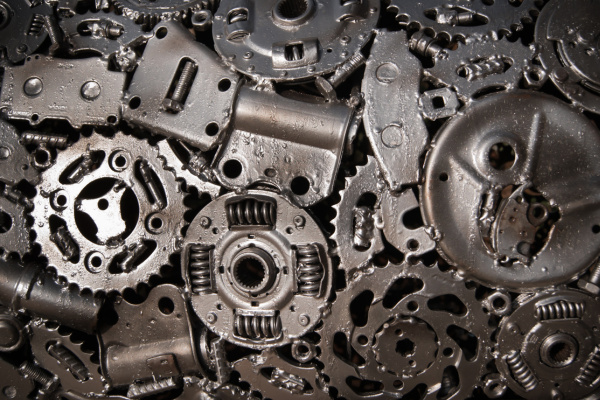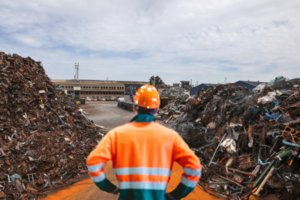Introduction to Scrap Metal Prices in Nigeria
The scrap metal sector in Nigeria plays a vital role in bolstering the nation’s economy by serving as a valuable supplier of raw materials for diverse industries. Understanding the dynamics of scrap metal prices is essential for a wide range of stakeholders, including scrap collectors, dealers, processors, and even end-users. This comprehensive guide aims to shed light on the factors influencing scrap metal prices in Nigeria, enabling readers to make informed decisions and navigate the complexities of this dynamic market.
The scrap metal industry in Nigeria has been steadily growing, driven by the country’s rapid industrialization and the increasing demand for recycled materials. Scrap metal, which includes ferrous metals like steel and iron, as well as non-ferrous metals like copper, aluminum, and brass, is a valuable commodity that can be reused and repurposed. Consequently, the prices of these materials fluctuate based on a variety of factors, making it crucial for industry participants to stay informed and adapt their strategies accordingly.
Understanding scrap metal prices is not only important for scrap collectors and dealers, but also for manufacturers, construction companies, and even individual consumers who rely on these materials for their operations or personal projects. This guide seeks to provide a comprehensive understanding of the scrap metal market in Nigeria, enabling stakeholders to enhance their decision-making, streamline operations, and leverage the potential offered by this ever-evolving industry landscape.
Factors Influencing Scrap Metal Prices in Nigeria
The prices of scrap metals in Nigeria are influenced by a complex interplay of global and domestic factors. One of the primary drivers is the fluctuation in global commodity prices, which can have a significant impact on the Nigerian market. As a major exporter of scrap metals, Nigeria’s prices are closely tied to the international market, with changes in global supply and demand directly affecting the prices paid to local scrap collectors and dealers.
Domestic supply and demand dynamics also play a crucial role in determining scrap metal prices in Nigeria. The availability of scrap materials, the level of industrial activity, and the demand from domestic manufacturers and processors all contribute to the pricing landscape. Factors such as transportation and logistics costs, which can vary across different regions of the country, can also influence the final prices paid to scrap suppliers.
Another important factor is the currency exchange rate, which can have a significant impact on the prices of imported scrap metal as well as the competitiveness of Nigerian scrap metal exports. Fluctuations in the value of the Nigerian naira against major international currencies can lead to changes in the prices paid by local buyers and the revenue received by scrap metal exporters.
Understanding these multifaceted factors is essential for stakeholders in the Nigerian scrap metal industry to make informed decisions, adjust their strategies, and capitalize on market opportunities. By staying abreast of the latest trends and developments in the global and domestic scrap metal markets, industry participants can better navigate the complexities of this dynamic industry.
Types of Scrap Metals and Their Pricing
The scrap metal industry in Nigeria encompasses a diverse range of materials, each with its own unique pricing dynamics. Broadly, scrap metals can be divided into two main categories: ferrous metals and non-ferrous metals.
Ferrous metals, such as steel and iron, are the most commonly traded scrap materials in Nigeria. The prices of ferrous scrap are influenced by factors like the global steel market, the availability of raw materials, and the demand from domestic steel producers. Trends and fluctuations in ferrous metal prices can be volatile, as they are closely tied to the performance of the manufacturing and construction sectors, which are major consumers of these materials.
Non-ferrous metals, on the other hand, include copper, aluminum, brass, and other metals that do not contain iron. These materials are often more valuable than ferrous scrap and are in high demand for their versatility and recyclability. Prices for non-ferrous metals are influenced by global supply and demand, as well as the specific characteristics and applications of each metal. For instance, copper is widely used in electrical and plumbing applications, while aluminum is popular in the automotive and packaging industries.
Comparing the pricing of different non-ferrous metals in Nigeria can reveal interesting insights. Copper, for example, is typically the most valuable non-ferrous scrap metal, with its price often fluctuating based on international market conditions. Aluminum and brass, while less valuable than copper, also have their own distinct pricing dynamics and are sought after for their unique properties and applications.
Understanding the nuances of scrap metal pricing, both for ferrous and non-ferrous materials, is crucial for stakeholders in the Nigerian scrap metal industry. By staying informed about the factors influencing the prices of different scrap metals, industry participants can make more strategic decisions, optimize their operations, and capitalize on market opportunities.
| Scrap Metal Type | Average Price (per kg) |
|---|---|
| Aluminum | ₦150 |
| Copper | ₦1,000 |
| Brass | ₦600 |
| Stainless Steel | ₦200 |
| Lead | ₦300 |
Understanding the Scrap Metal Supply Chain in Nigeria
The scrap metal supply chain in Nigeria is a complex network of various players, each with their own roles and responsibilities. At the foundation of this supply chain are the scrap collectors, who are responsible for gathering and aggregating scrap materials from various sources, such as households, businesses, and industrial facilities.
These scrap collectors then sell their collected materials to scrap dealers, who act as intermediaries between the collectors and the larger processors and exporters. Scrap dealers play a crucial role in the supply chain, as they are responsible for sorting, grading, and sometimes even processing the scrap metals before selling them to larger-scale operations.
The next link in the chain are the scrap metal processors, who are equipped with the necessary infrastructure and expertise to further process and refine the scrap materials. These processors may engage in activities such as shredding, melting, and separating different metal types to prepare the scrap for sale or export.
Finally, the scrap metal exporters are the entities responsible for selling the processed scrap materials to international markets. These exporters must navigate the complex regulatory landscape, including customs and trade policies, to ensure the smooth flow of scrap metal out of Nigeria and into the global supply chain.
However, the scrap metal supply chain in Nigeria is not without its challenges and inefficiencies. Factors such as limited infrastructure, transportation bottlenecks, and lack of coordination between the various players can lead to disruptions and price fluctuations. Understanding the roles and responsibilities of each player in the supply chain, as well as the existing challenges, is crucial for stakeholders to optimize their operations and capitalize on the opportunities presented by the scrap metal industry in Nigeria.
Fluctuations in Scrap Metal Prices: Causes and Trends
The prices of scrap metals in Nigeria are subject to significant fluctuations, driven by a variety of factors. One of the key drivers of these price fluctuations is the seasonal nature of the scrap metal industry. Certain times of the year, such as the rainy season or the holiday periods, can see a decrease in the availability of scrap materials, leading to a rise in prices as demand outpaces supply.
In addition to seasonal variations, the prices of scrap metals in Nigeria are also heavily influenced by economic and political events, both domestically and globally. Factors such as changes in government policies, trade agreements, and global economic conditions can have a direct impact on the prices paid for scrap materials. For example, geopolitical tensions or economic downturns can lead to a decrease in global demand for scrap metals, resulting in lower prices for Nigerian scrap exporters.
Looking at the long-term trends in scrap metal prices in Nigeria, it becomes evident that the industry has experienced significant fluctuations over the years. While there have been periods of relative stability, the prices have also seen sharp spikes and declines, reflecting the dynamic nature of the global and domestic markets. Understanding these long-term trends and forecasting future price movements can be a valuable tool for stakeholders in the Nigerian scrap metal industry, enabling them to make more informed decisions and plan their operations accordingly.
By closely monitoring the various factors that influence scrap metal prices, industry participants can better anticipate and respond to market changes, mitigate risks, and capitalize on emerging opportunities. This knowledge can be particularly valuable for scrap collectors, dealers, and processors who need to make strategic decisions about their inventory, pricing, and investment strategies.
Strategies for Maximizing Profits in the Scrap Metal Trade
In the dynamic and competitive scrap metal industry in Nigeria, stakeholders must employ effective strategies to maximize their profits and remain competitive. One of the key strategies is effective inventory management, which involves carefully monitoring the supply and demand of scrap materials, as well as the fluctuations in prices. By optimizing their inventory levels and timing their purchases and sales, scrap metal traders can minimize their exposure to price volatility and capitalize on market opportunities.
Another important strategy is the art of negotiation. Scrap metal traders must develop strong negotiation skills to secure the best possible prices from their suppliers and buyers. This may involve leveraging market intelligence, building long-term relationships, and understanding the unique needs and constraints of their counterparts.
Diversification of scrap metal sources is also a valuable strategy for maximizing profits. By sourcing scrap materials from a variety of locations and suppliers, traders can mitigate the risks associated with regional price disparities and supply chain disruptions. This approach can also help them access a wider range of scrap metal types and grades, allowing them to cater to the diverse needs of their customers.
Finally, investing in value-added processing capabilities can be a game-changer for scrap metal traders in Nigeria. By engaging in activities such as sorting, shredding, or even smelting, traders can add significant value to their scrap materials, commanding higher prices and capturing a larger share of the profit margin. This strategy requires careful planning, investment in equipment and infrastructure, and the development of specialized skills and expertise.
By implementing these strategies, stakeholders in the Nigerian scrap metal industry can navigate the complexities of the market, optimize their operations, and position themselves for long-term success. The ability to adapt to changing market conditions, leverage negotiation skills, and invest in value-added processing can be the key to unlocking greater profitability in this dynamic industry.
Regulations and Policies Affecting Scrap Metal Prices in Nigeria
The scrap metal industry in Nigeria is subject to a range of government policies and regulations that can have a significant impact on the pricing and dynamics of the market. Understanding these regulatory frameworks is crucial for stakeholders to navigate the industry effectively and make informed decisions.
One of the primary areas of government intervention is through policies and regulations that directly affect the scrap metal trade. This may include import and export restrictions, tariffs, and other trade-related measures that can influence the flow of scrap materials in and out of the country. Changes in these policies can have a direct impact on the prices paid to scrap collectors and dealers, as well as the competitiveness of Nigerian scrap metal exports.
Environmental regulations also play a crucial role in the scrap metal industry. As concerns over sustainability and environmental impact grow, the government may introduce policies that aim to promote responsible recycling and disposal of scrap materials. These regulations can affect the costs associated with scrap metal processing and handling, ultimately influencing the prices paid to suppliers.
Taxation policies are another area of government intervention that can impact scrap metal prices in Nigeria. The imposition of taxes, levies, or other fiscal measures on the scrap metal trade can increase the overall costs for industry participants, potentially leading to higher prices for end-users or reduced profits for scrap collectors and dealers.
By closely monitoring the evolving regulatory landscape and understanding the implications of government policies, stakeholders in the Nigerian scrap metal industry can better anticipate and adapt to changes in the market. This knowledge can help them make more informed decisions, mitigate risks, and capitalize on opportunities presented by the shifting policy environment.
Comparing Scrap Metal Prices Across Different Regions in Nigeria
The scrap metal industry in Nigeria is characterized by regional price disparities, with significant variations in the prices paid for scrap materials across different parts of the country. These regional price differences can be attributed to a variety of factors, including transportation and logistics costs, local supply and demand dynamics, and the presence of major scrap metal hubs.
One of the key factors contributing to regional price variations is the cost of transporting scrap materials from the collection points to the processing or export facilities. Regions with better infrastructure, such as well-developed road networks and efficient transportation systems, may enjoy lower logistics costs, allowing for higher prices paid to scrap suppliers. Conversely, areas with limited transportation options or higher fuel prices may see lower scrap metal prices due to the increased costs of moving the materials.
The presence of major scrap metal hubs, such as Lagos, Kano, or Port Harcourt, can also influence regional pricing. These hubs often have a higher concentration of scrap dealers, processors, and exporters, creating a more competitive and efficient market. Scrap suppliers in these regions may benefit from higher prices due to the increased demand and the ability of traders to access a wider range of buyers.
Analyzing the price trends and disparities across different regions in Nigeria can uncover opportunities for arbitrage and cross-regional trade. Scrap metal traders who are able to identify and capitalize on these regional price differences can potentially generate higher profits by sourcing from lower-priced areas and selling to higher-priced markets. This strategy requires a deep understanding of the local market dynamics and the ability to navigate the logistical and regulatory challenges associated with cross-regional trade.
By comparing scrap metal prices across different regions in Nigeria, industry stakeholders can make more informed decisions about their sourcing, pricing, and distribution strategies. This knowledge can help them optimize their operations, enhance their competitiveness, and ultimately maximize their profits in the dynamic scrap metal industry.
Conclusion
In conclusion, the scrap metal sector in Nigeria plays a crucial role in the country’s economy, supplying raw materials for industries and contributing to sustainability through recycling. Understanding the factors influencing scrap metal prices is essential for stakeholders to make informed decisions in this dynamic market. The industry has seen steady growth driven by industrialization and increasing demand for recycled materials.
However, challenges such as seasonal fluctuations, economic and political events, and regulatory frameworks require industry participants to adapt and strategize effectively. By employing strategies like effective inventory management, diversification of sources, and value-added processing, stakeholders can maximize profits and navigate the complexities of the scrap metal trade.
It is crucial for stakeholders to stay informed about regulatory changes and market trends to optimize their operations and capitalize on opportunities in the Nigerian scrap metal industry.
For all your scrap metal needs, look no further than Ify-darl International Limited. With competitive prices and excellent customer service, Ify-darl is your go-to source for buying and selling scrap metal in Nigeria.
Contact Ify-darl today to get the best deals on your scrap metal! Visit our website at Ify-darl.com or call us at 08167310134 .
Don’t miss out on the opportunity to turn your scrap into cash with Ify-darl!




